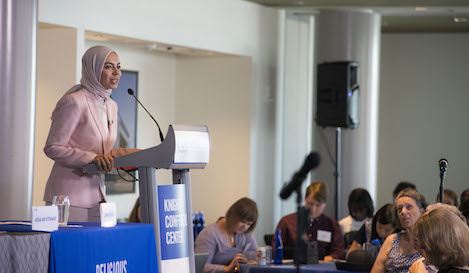
RNA - Research shows that 9 out of 10 news stories about Islam involve terrorism and violence. The one-hour conversation was moderated by Engy Abdelkader, a researcher for Georgetown University’s Bridge Initiative, and featured John Esposito, Arsalan Iftikhar, Dalie Mogahed, Ayman Mohyeldin and Roland Schatz, who explored how the media frames Islamic culture and whether journalists have a responsibility to balance positive and negative coverage. More than 100 journalists attended, requiring overflow seating to accommodate the crowd.
While Islam is the second-largest and fastest-growing religion worldwide, most Americans say they know little to nothing about it, according to a Pew Research Center study. Mohyeldin, an NBC News foreign correspondent, said, “The religion has been greatly conflated with geopolitics,” and that many Americans cannot differentiate between the religion itself and the political affairs of Islamic countries.
People who are exposed to news coverage about Muslims are more likely to think badly about Muslims as a whole and support discriminatory policies, laws and violence in Muslim countries, according to the museum’s Religious Freedom Center. These biases, however, can be countered by having interactions with Muslims and could be eliminated through education, participation and engagement, Mohyeldin said.
The panelists explored ways to improve coverage, such as featuring more stories about Muslim culture and daily life in between coverage of the Middle Eastern conflict and terrorism. Such stories could help remove what Esposito, a professor of International Affairs and Islamic Studies at Georgetown University, called a “distorted lens through which we view Muslims [that] continues to influence domestic and foreign policy.”
Esposito referenced recent statements made by Republican presidential candidate Donald Trump that target followers of the religion. Esposito said that Americans adhere to “Islamic exceptionalism” — meaning that American journalists, politicians and citizens talk about Muslims in a much more negative and derogatory fashion than they would speak about any other minority groups in the nation.
Mogahed, director of research at the Institute for Social Policy and Understanding in Washington, D.C., said the “media is simply reflecting the biases that exist in society.” While Muslims make up less than 1 percent of the U.S. population, according to the Pew Research Center, Mogahed said the issue of Islamophobia affects 100 percent of the American population because it affects every American who cares about freedom and democracy.
The panelists recommended publishing more human-interest and feature stories about American Muslims to help minimize this bias and said the religion needs to be separated from the fear that developed after the 9/11 terrorist attacks.
Journalists, including Mohyeldin and Arsalan Iftikhar, editor of The Islamic Monthly magazine, emphasized the importance of contextualizing stories about extremism and jihadism and recognizing the small size of the Islamic State compared to the worldwide Muslim population.
Mogahed also said some acts of violence are labeled as terrorism depending on the identity and religion of the person accused of committing the crime. Mogahed pointed out that the majority of terrorism on American soil stems from white supremacists, but such acts are often not called by the name terrorism.
“Terrorism is the word that means nothing but justifies everything,” Mogahed said.
847/940